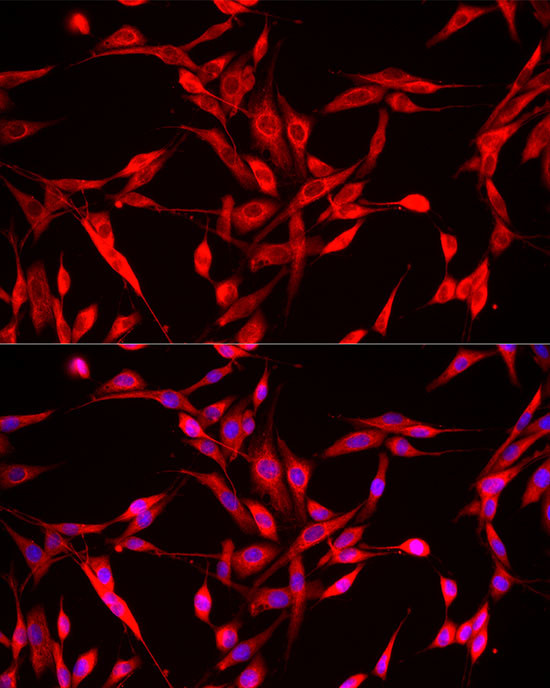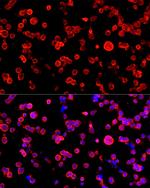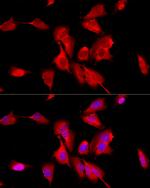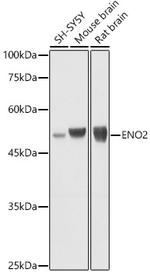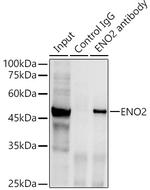Search Thermo Fisher Scientific
Product Details
PA5-88488
Species Reactivity
Host/Isotype
Class
Type
Immunogen
Conjugate
Form
Concentration
Purification
Storage buffer
Contains
Storage conditions
Shipping conditions
RRID
Product Specific Information
Immunogen sequence: VIKDKYGKDA TNVGDEGGFA PNILENSEAL ELVKEAIDKA GYTEKIVIGM DVAASEFYRD GKYDLDFKSP TDPSRYITGD QLGALYQDFV RDYPVVSIED PFDQDDWAAW SKFTANVGIQ IVGDDLTVTN PKRIERAVEE KACNCLLLKV NQIGSVTEAI QACKLAQENG WGVMVSHRSG ETEDTFIADL VVGLCTGQIK TGAPCRSERL AKYNQLMRIE EELGDEARFA GHNFRNPSVL; Positive Samples: HeLa, LO2, SH-SY5Y, U-251MG, Mouse skeletal muscle, Mouse liver, Mouse brain, Rat brain, Rat skeletal muscle; Cellular Location: Cell membrane, Cytoplasm
Target Information
Neuron specific enolase (NSE, ENO1, ENO2, ENO3) is an enzyme that catalyzes the conversion of 2-phosphoglycerate to phosphoenolpyruvate in the glycolytic pathway, and the reverse reaction in gluconeogenesis. NSE has a high stability in biological fluids and can easily diffuse to the extracellular medium and cerebrospinal fluid (CSF) when neuronal membranes are injured.NSE is one of three mammalian enolases, which are also known as ENO1, ENO2, and ENO3 or alternately as enolase alpha, beta and gamma. The alpha-subunit is expressed in most tissues, the beta-subunit only in muscle, and the gamma-subunit is expressed primarily in neurons, in normal and in neoplastic neuroendocrine cells. Co-expression of NSE and chromogranin A is common in neuroendocrine neoplasms. Since neurons require a great deal of energy, they are very rich in glycolytic enzymes such a GAPDH and NSE. Antibodies to NSE protein are useful to identify neuronal cell bodies, developing neuronal lineage and neuroendocrine cells. Release of NSE from damaged neurons into CSF and blood has also been used as a biomarker of neuronal injury. NSE is used clinically as a sensitive and useful marker of neuronal damage in several neurological disorders including stroke, hypoxic brain damage, status epilepticus, Creutzfeldt-Jakob disease, and herpetic encephalitis. Further, NSE is found in elevated concentrations in plasma and certain neoplasias that include pediatric neuroblastoma and small cell lung cancer.
For Research Use Only. Not for use in diagnostic procedures. Not for resale without express authorization.
References (0)
Bioinformatics
Protein Aliases: 2-phospho-D-glycerate hydro-lyase; 2-phospho-D-glycerate hydrolyase; Eno; ENOG; Enolase 2; enolase 2 (gamma, neuronal); epididymis secretory protein Li 279; gamma enolase; Gamma-enolase; Neural enolase; neuron specific enolase; neuron specific gamma enolase; Neuron-specific enolase; Neuronal Enolase; neuronal enriched enolase; neurone-specific enolase; NSE
Gene Aliases: AI837106; D6Ertd375e; Eno-2; ENO2; HEL-S-279; NSE; RNEN3
UniProt ID: (Human) P09104, (Mouse) P17183, (Rat) P07323
Entrez Gene ID: (Human) 2026, (Mouse) 13807, (Rat) 24334

Performance Guarantee
If an Invitrogen™ antibody doesn't perform as described on our website or datasheet,we'll replace the product at no cost to you, or provide you with a credit for a future purchase.*
Learn more
We're here to help
Get expert recommendations for common problems or connect directly with an on staff expert for technical assistance related to applications, equipment and general product use.
Contact tech support
